#grand duke alexei of russia
Explore tagged Tumblr posts
Text

Empress Alexandra Feodorovna of Russia with her only son Grand Duke Alexei Nicholaievich of Russia, 1913.
#Empress Alexandra Feodorovna of Russia#imperial russia#imperial family#russian imperial family#romanovs#colored photography#1910s#princess alix of hesse#empress alexandra of russia#empress alexandra feodorovna#grand duke alexei of russia#tsarevich alexei#romanov tercentenary#1913#history colored
36 notes
·
View notes
Text
Gatchina, 1795.

#Russian history#Russian empire#History#alexey arakcheev#aleksey arakcheyev#alexander i of russia#paul i of russia#Grand duke Konstantin pavlovich#Grand Duke Konstantin Pavlovich of Russia
79 notes
·
View notes
Text

Grand Duke Alexei Alexandrovich of Russia by Sokolov. I think the original is in the State Tretyakov Gallery.
37 notes
·
View notes
Text
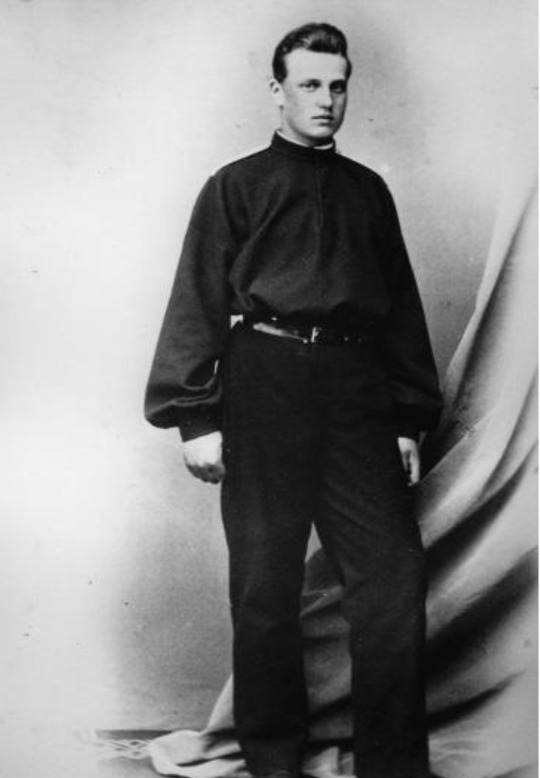

Grand Duke Alexey Alexandrovich in youth.
Grand Duke Alexey Alexandrovich (1850 - 1908)
Grand Duke Alexis was the fifth child and the fourth son of Alexander II and Empress Maria Alexandrovna. Alexis was Nicholas II's favorite uncle, as well as a favorite of Empress Maria Feodorovna (and a frequent dance partner of the Empress since Sacha did not like to dance. He also acted as a mediator between her and Sacha at the very beginning of their marriage, when they had differences.) He stood as one of Tsarevich Alexis' godparents.
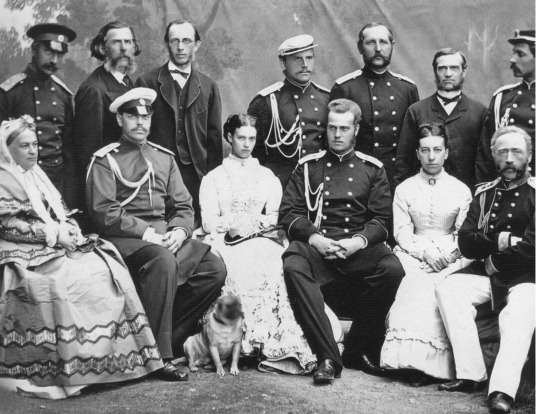

1. Maria Feodorovna sitting between Tsarevich Alexander and Grand Duke Alexis; 2. Grand Duke Alexis with his family, embracing his brother Grand Duke Sergei Alexandrovich
Alexey made a career in the Navy. Grand Duke Alexey rose through the ranks, holding many important posts. He was appointed General Admiral by his brother Alexander III as a reward for making a significant contribution to modernizing the equipment of the Russian navy. But his improvements might not have been enough. After the Russian defeat to the Japanese in the Battle of Tsushima, Alexey was relieved of his command for incompetence (he died just three years after this, at age 58.) It did not help that his expenses in jewelry for the beautiful women in his life had increased through the years, and he was suspected of corruption. He had acquired a reputation as a "man of fast women and slow ships." Of course, somebody had to pay for Russia's loss to Japan, and he was in the right place at the right time.
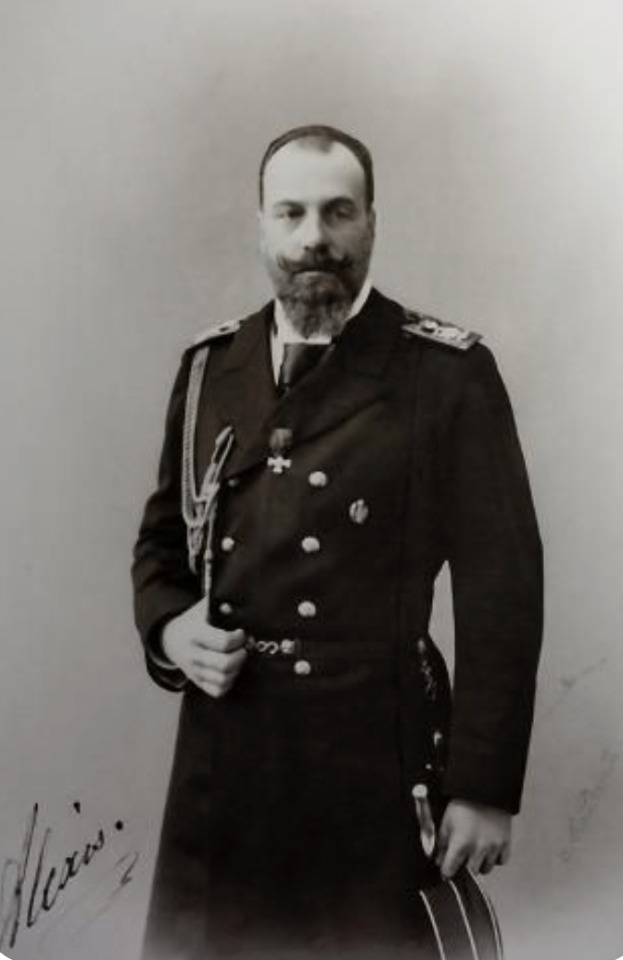
Admiral Grand Duke Alexei Alexandrovich
Was Alexey a hero or a rake? Neither, it seems. The following is the consensus of several authors and contemporaries who knew him well: He had a kind heart and would not intentionally hurt anybody. He was not a thief. He was not a plotter or acted against anybody for his own advancement, but he was, in fact, not very competent as an admiral and made a number of wrong decisions that had terrible consequences for the Russian naval forces.
Alexis was beloved by most of his family, although his cousin Grand Duke Alexander Mikhailovich, did not have anything good to say about him in his book "Once a Grand Duke;" Sandro paints Alexey as a hard-drinking, greedy, womanizing dilettante without any redeeming qualities. Sandro very much wanted Alexis' job and was well situated to get it; I don't know how objective he could be under those circumstances (Sandro's book is used as a source for much of what is written about the Romanovs, but inaccuracies and mistakes have been identified in the information it provides.)
Alexis suffered a broken heart early in his life. Although his affairs with beautiful women were notorious throughout his life, he is the only Grand Duke, son of a Tsar, who remained unmarried. His is a life of plenty but not a happy life.
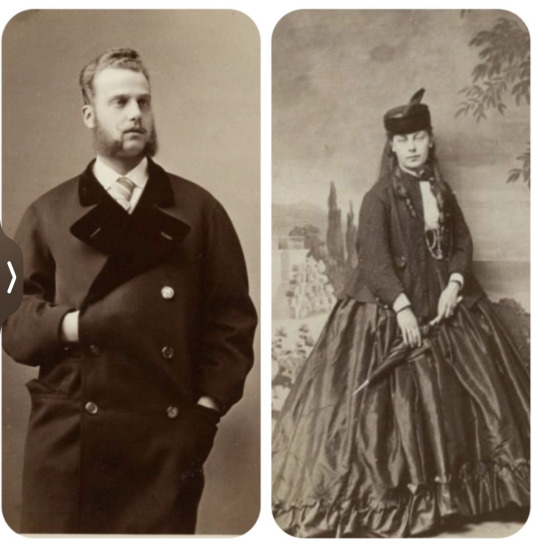
Grand Duke Alexei Alexandrovich and Alexandra Zhurovskaya
Alexei fell in love with one of his mother's ladies-in-waiting at age twenty. Her name was Alexandra Zhukovskaya; she was the daughter of a poet (who had taught the Imperial children) and not an aristocrat. Alexandra became pregnant. Alexis’s father, Alexander II, opposed the affair violently and said no when Alexis asked permission to marry. The Emperor also refused his son's request to grant the mother and unborn child a title. Some historians believe Alexey married Alexandra, and the Russian Orthodox church annulled the marriage at the Emperor's behest.

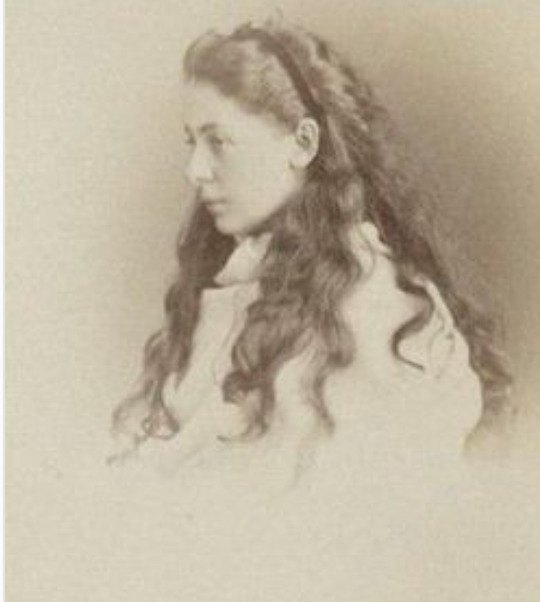
Alexandra Zuhrovskaya
There are letters in which Alexis begs his mother, Empress Maria Alexandrovna, to intercede so that he does not have to abandon Alexandra; they also declare his love for her. Alexander II sent Alexey on an extensive world tour (he was away from Russia for two years; his tour included a very successful visit to the United States.) Alexandra gave birth to their son while he was away. The Imperial family continued to put pressure on her until she terminated the relationship with Alexey. She was married off to Baron Christian-Henrich von Wohrmann and sent to live with him in Munich/Bavaria. Alexis never saw her again but did not abandon her and his son. He settled a large sum and a generous lifetime pension on Alexandra and made provisions for the future of the boy.
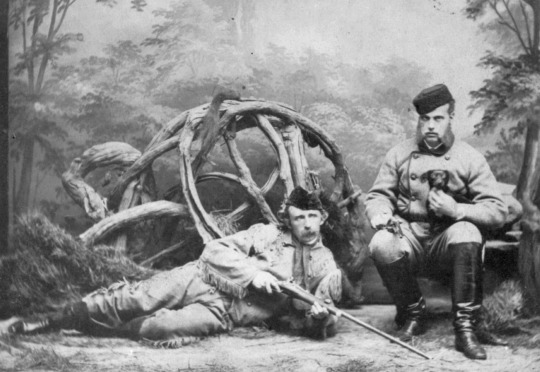
Grand Duke Alexander Alexandrovich with General Custer - the photo commemorates their "buffalo hunt."
Before her child was born, Alexandra had secured the title of Baroness Seggiano from the Republic of San Marino, with the right to pass it to her son. After Alexander II died and Alexey's elder brother was crowned Alexander III, Alexey's son was given the Russian nobiliary title of Count Belevsky and a coat of arms.

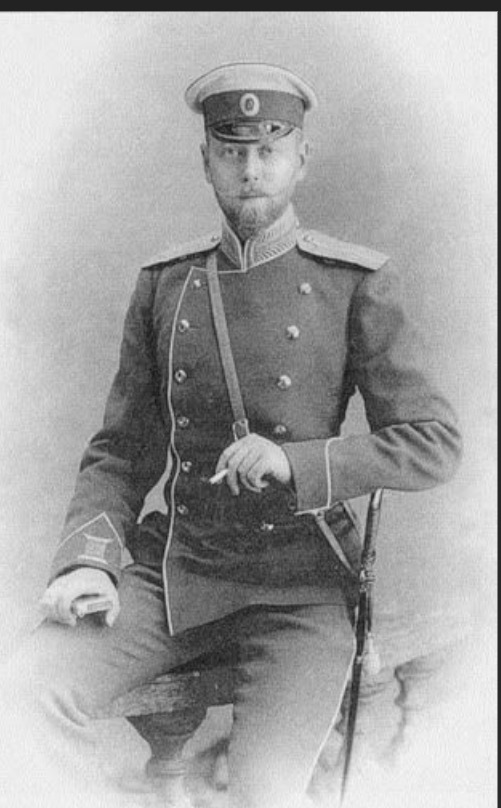
Grand Duke Alexis' son: Count Alexey Alexeevich Belevskiy-Zhukovskiy (1871–1931)
Count Alexey Alexeevich Belevskiy-Zhukovskiy (1871–1931), the Grand Duke's son followed a military career like all Romanov males. His first marriage (he married twice) took place in Ilinskoye Manor, the state of his uncle Grand Duke Sergei Alexandrovich, near Moscow. The Count acted as his uncle's aide-de-camp for many years. He was well-accepted in Imperial circles. There are several candid photos of Sergei and his wife Ella, where he can be identified (he looks more like his uncle Sergei than his father.) As far as we know, he never met his father (although I doubt that Grand Duke Sergei did not, at some point, arrange a meeting between his brother and his nephew.) Several of the Count's descendants live in New York City.
It is interesting to note that the major source of relentless opposition to Alexey's marriage to Alexandra and to the legitimization of his son was Emperor Alexander II, the same man who would have children with his much younger mistress, establishing a second family while his first wife was still alive, and who would bring that second family to live in the Winter Palace where his first wife resided and where she died. He married his second wife barely a month after Alexey's mother's death.
#russian history#romanov dynasty#imperial russia#Grand Duke Alexey Alexandrovich#Alexander III#Alexander II#Grand Duke Sergei Alexandrovich#Grand Duke Alexander Mikhailovich#Count Alexey Alexeevich Belevskiy-Zhukovskiy#Alexandra Zhukovskaya
82 notes
·
View notes
Text

Grand Duke Paul Alexandrovich kept his word which he had given me; my service with him was comfortable and pleasant. We were almost the same age, twenty-five, and twenty-six years old. He did not yet have a particular residence and occupied an apartment in the Winter Palace and had only a limited staff because he lived exclusively at the Emperor's expense.
Grand Duke Paul had a fairly even temperament. He had moments of liveliness and being on edge, but in general, he was of great benevolence, above all looking out for those people who were dependant on him in whatever way. He was never very talkative and kept a modest and confined life, principally for reasons of his health. During this time the doctors strongly believed that the symptoms of tuberculosis had manifested in the Grand Duke.
I remember that at the beginning of my service with him, Grand Duke Paul went, along with his brother Grand Duke Serge Alexandrovich and his wife Grand Duchess Elizabeth Feodorovna, on his first trip to Athens. This event remains engraved in my memory because it was the reason for my first voyage abroad.
Up until his marriage, which had taken place during the summer of 1889, Grand Duke Paul Alexandrovich lived in the Winter Palace, always keeping the same retiring lifestyle. At the beginning of Spring that year, the Grand Duke left for the second time to go to Greece, to revisit his fiancée, Alexandra Georgievna. This time, I accompanied him.
This voyage gave me a brilliant dream of light and colour. After staying six weeks as guests of the court in Athens, we returned to Petersburg, followed by Princess Alexandra of Greece, where the marriage took place in June 1889.
The newlyweds were installed in their palace, on the Neva quay, behind the Church of the Annunciation, facing the Naval Corps.
MEMORIES OF ALEXEI VOLKOV Personal Valet to Tsarina Alexandra Feodorovna 1910 - 1918

#paul alexandrovich#imperial russia#romanov#grand duke#romanov family#alexandra georgievna#grand duchess#royalty#greek royal family#19th century#alexei volkov
6 notes
·
View notes
Text
Romanovs men edit💋
my edit made by using capcut!!
i'm in love help mee😩😜
They are all so handsome, gentle and clever
#my edit#capcut edit#capcut#my first love#romanovs men#george alexandrovich#nicholas i of Russia#alexander iii#Sasha#peter the great#tsar nicholas ii#alexei nikolaevich#grand duke mikhail pavlovich#grand duke mikhail alexandrovich#alexander ii
47 notes
·
View notes
Text

Well if we were going with Kutuzov then it would have gone like this instead...


It do be like that on Imperial Russian Army High Command in 1812 🥲🥲🤪
#not art#nothing of significance ofc 😅#history memes#napoleonic#napoleonic era#napoleon's invasion on russia#alexey ermolov#pyotr ivanovich bagration#petre bagrationi#prince bagration#grand duke konstantin#tsar alexander i#michael andreas barclay de tolly#pyotr bagration#michael barclay de tolly#михаил богданович барклай-де-толли#алексей ермолов#mikhail kutuzov#Михаил иларионович Кутузов#yeah kutuzov realized the perils of waging battle at borodino but whatcha gonna do...#let naps nab all the russian countryside?? 🤪#self reblog
74 notes
·
View notes
Text
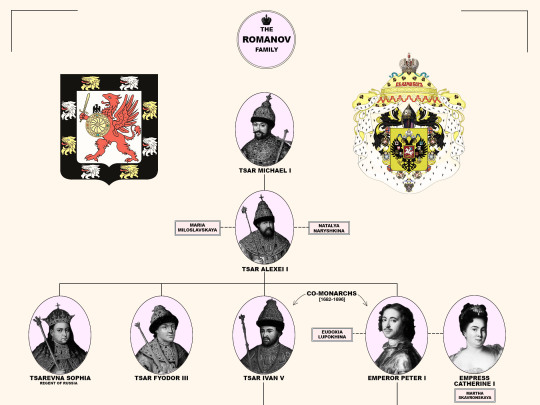
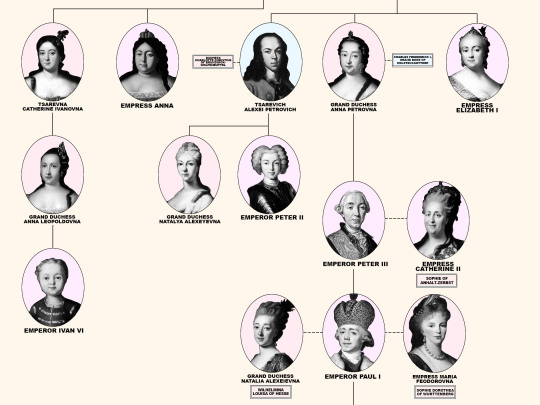
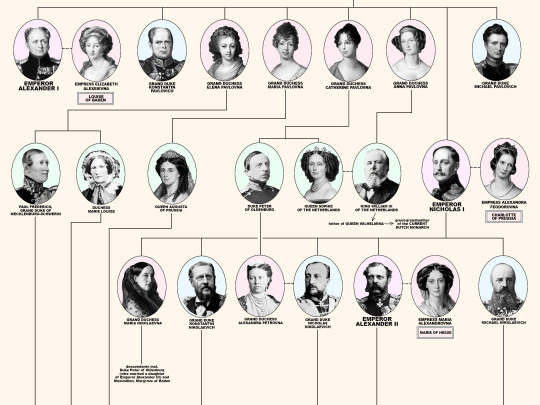
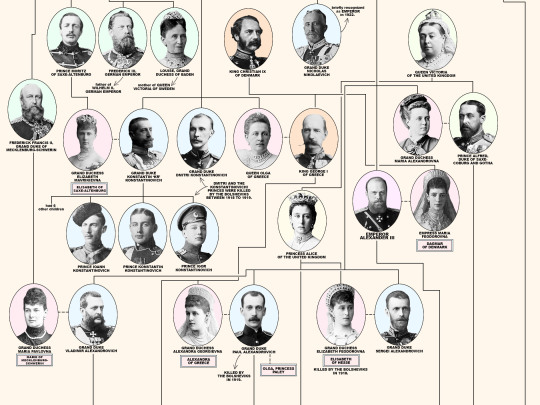
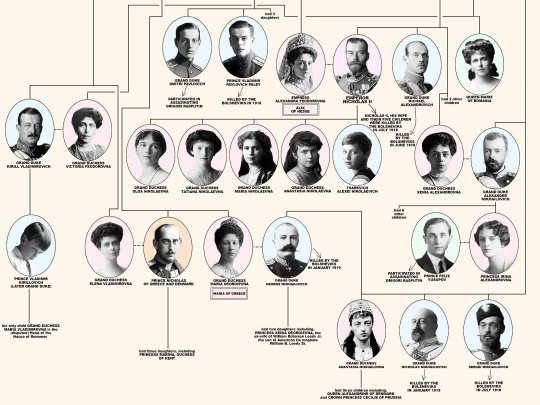
Members of the House of Romanov, the last reigning Dynasty of Russia.
From the first Romanov Russian Tsar Michael I (reigned 1613-1645) until the last Emperor Nicholas II (reigned 1894-1917). Including the 18 members of the house executed from 1918 until 1919; Grand Duke Michael Alexandrovich (13 June 1918). Nicholas II, Empress Alexandra Feodorovna, Grand Duchesses Olga Nikolaevna, Tatiana Nikolaevna, Maria Nikolaevna, Anastasia Nikolaevna, and Tsarevich Alexei Nikolaevich (17 July 1918). Grand Duchess Elizabeth Feodorovna, Grand Duke Sergei Mikhailovich, Prince Ioann Konstantinovich, Prince Konstantin Konstantinovich, Prince Igor Konstantinovich, and Prince Vladimir Paley (18 July 1918). Grand Duke Paul Alexandrovich, Grand Duke Dmitri Konstantinovich, Grand Duke Nicholas Mikhailovich, and Grand Duke George Mikhailovich (28 January 1919).
#romanovs#history#nicholas ii#alexandra feodorovna#olga nikolaevna#tatiana nikolaevna#maria nikolaevna#anastasia nikolaevna#alexei nikolaevich#myedits#peter i#peter ii#Peter iii#peter iii#Catherine the great#tsar alexei i#tsar michael#tsar paul i#alexander i#alexander ii#alexander iii#nicholas i#ancestry
411 notes
·
View notes
Text

Heir Tsesarevich and Grand Duke Alexei Nikolaevich of Russia.
40 notes
·
View notes
Text
Wonderful picture. I have always loved the section of the image with the interaction between Grand Duke Vladimir and Grand Duchess Olga Vladimirovna.

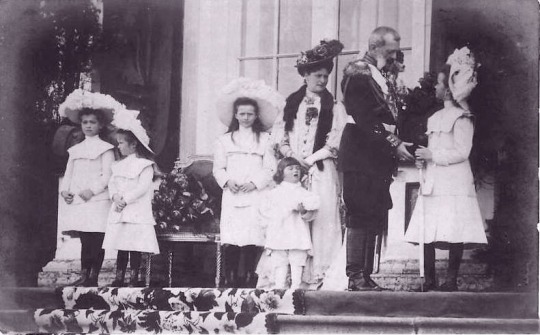



The Imperial Family with Grand Duke Vladimir Alexandrovich at the Catherine Palace, 1907.
#otma#Grand Duke Vladimir#Empress Alexandra Feodorovna#Grand Duchess Olga Nikolaevna#Grand Duchess Tatiana Nikolaevna#Grand Duchess Maria Nikolaevna#Tsarevich Alexei Nikolaevich#Grand Duchess Anastasia Nikolaevna#Romanov dynasty#Imperial Russia
77 notes
·
View notes
Text
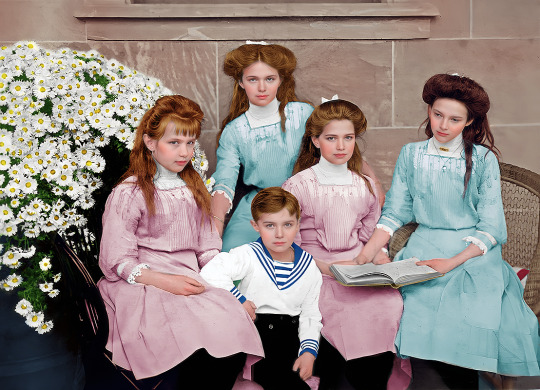
Grand Duchesses Olga, Tatiana, Maria and Anastasia with their brother Grand Duke Alexei, Darmstadt, 1910.
#grand duchess olga of russia#grand duchess olga nicholaievna#grand duchess olga nicholaievna of russia#grand duchess tatiana of russia#grand duchess tatiana#grand duchess tatiana nicholaievna#grand duchess tatiana nicholaievna of russia#grand duchess olga#grand duchess maria of russia#grand duchess maria nicholaievna#grand duchess maria nicholaievna of russia#grand duchess anastasia#grand duchess anastasia nicholaievna#grand duchess anastasia of russia#grand duchess anastasia nicholaievna of russia#grand duke alexei of russia#grand duke alexei#tsarevich alexei#tsesarevich alexei#otma#otmaa#romanovs#imperial russia#imperial family#russian imperial family#1910s#colored photography#1910#wolfsgarten#schloss wolfsgarten
66 notes
·
View notes
Text
Romanovs and their crazy love stories

Historical background:
Aleksey Okhotnikov, a handsome young officer who had a secret love affair with empress Elizabeth Alexeievna and who most probably was a father of her second daughter. Alexander the Cuckold graciously claimed the girl as his own. She died soon anyway.
Okhotnikov and Elisabeth were pining for each other for a really long time, exchanging meaningful stares, sighing heavily and making all the slowburn appreciators go crazy.
(# forbidden love # mutual pining # slowburn # UST # RST)
Elizabeth left a diary where she described her love affair. When, after her and Alexander's death, this diary was read by emperor Nicholas I and his wife, they immediately decided to burn it. I guess, it was a little bit to spicy for their taste. They wouldn't survive ao3. Luckily, some parts of that diary still made their way to us.
There was a nice legend that Okhotnikov was killed by some shady guy who sneaked up on him in a dark alley when Okhotnikov left the theater (fr, dude, haven't you ever watched Batman?), and some people even said that the culprit was Grand Duke Konstantin (why?? to restore his brother's honor, I guess??? (lol, no, he totally didn't give a damn) maybe he had a secret crush on Alexander's wife?? I guess we'll never find out the truth)
For real, though, we'll never find out the truth, cause the latest researches found out that Okhotnikov was never attacked with a knife, he simply died from tuberculosis. It was just a legend. Admittedly, a nice one.
#russian history#alexander i of russia#history#russian empire#napoleonic era#napoleonic wars#alexander i#historical shitpost#Elisabeth alexeievna#Alexey Okhotnikov#Aleksei Okhotnikov#Elisaveta Alexeievna#romanovs#napoleonic shitpost#grand duke konstantin pavlovich of russia#Grand duke Konstantin Pavlovich
46 notes
·
View notes
Text

Detail from a portrait of the elder surviving children of Emperor Alexander II of Russia, ca. 1857, by Hau.
#grand duke nicholas alexandrovich#emperor alexander iii#grand duke vladimir Alexandrovich#grand duke alexei alexandrovich#grand duchess maria alexandrovna#romanov#russia#vladimir ivanovich hau#portrait detail
36 notes
·
View notes
Text
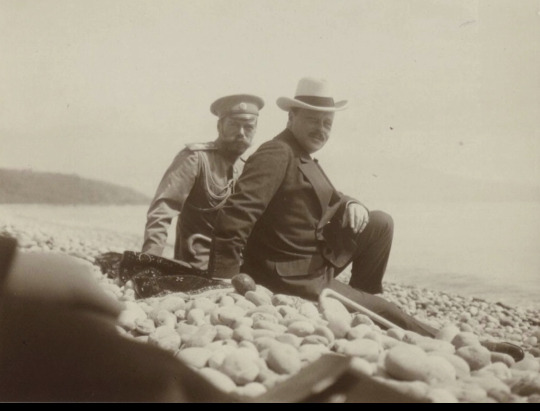

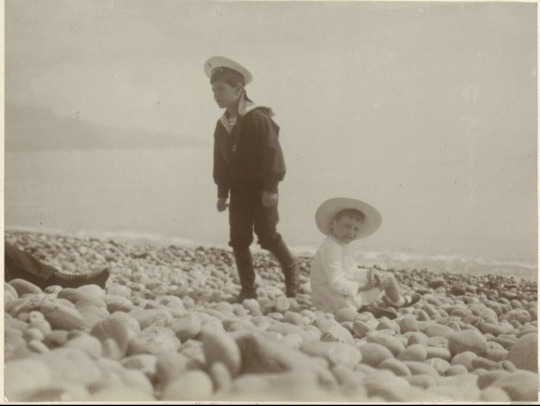

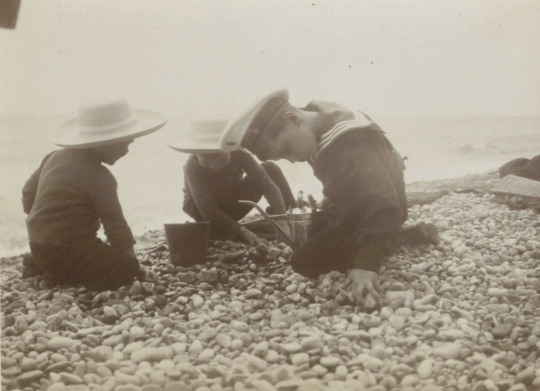
Nicholas II, Grand Duke Ernst Ludwig of Hesse, Tsarevich Alexei, Grand Duke Ernst’s sons and unknown ladies, probably Nannies

Grand Duchess Anastasia and her cousins. There is a little boy I don’t recognize.

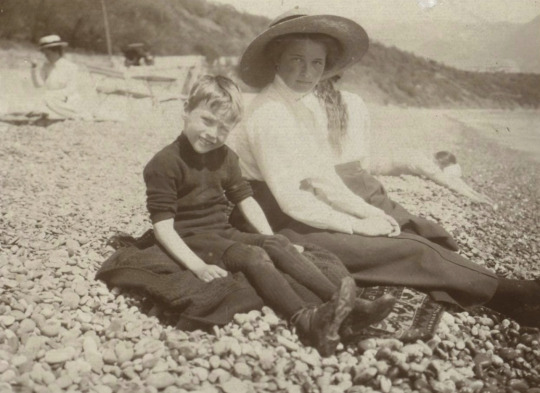

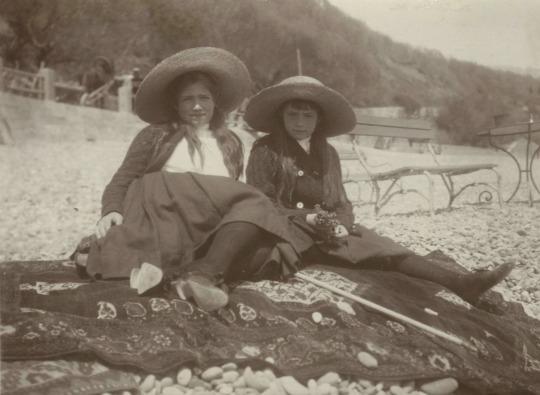
Grand Duke Ernst Ludwig with his sons, George Donatus and Ludwig and his nieces the Grand Duchesses.
Tsar Nicholas II and Grand Duke Ernst were excellent fathers who enjoyed their children
#russian history#imperial russia#romanov dynasty#otma#grand duke ernst ludwig of hesse#Nicholas II#Hereditary Grand Duke George Donatus#Prince Ludwig of Hesse#tsarevich alexei
21 notes
·
View notes
Text

"In 1913, the Romanovs celebrated the tercentenary of the dynasty's rise to power. As expected, the planned festivities were glorious. The previous years had been one of prosperity, the industrialization continued to evolve and this economic flourishing made it possible to celebrate the family's success grandly. Politicians and aristocracy hoped that the memory of great figures of the past could strengthen the unity of the nation around the Tsar. The Imperial family left Tsarskoye Selo for the Winter Palace in St. Petersburg for celebrations that began on March 6 with a te-déum in Kazan Cathedral. The following days were full of ceremonies and festivities for the Tsars, whether receiving delegations from all parts of Russia in typical costumes, or going to balls. Alexandra attended in a court dress and wearing the Kokoshnik, the traditional head arrangement of Russian women. The daughters wore white dresses with the ribbon of the Order of St. Catherine, and all the Grand Dukes were present. Olga and Tatiana, "the big pair", already attended parties as adults and could wear beautiful long dresses. Even the Faberge egg that Nicholas gave to Alexandra that year honored the dynasty. Decorated with images of all the Romanov Tsars, it had inside as a surprise two maps of Russia, one from 1613 and the other from 1913. In May, the family boarded a ship to Kostroma in order to repeat the steps of Michael, the first Tsar of the family, from the Ipatiev monastery, where he lived, to the throne. Everywhere, peasants greeted the procession effusively, even entering the water of the Volga River to get a closer look at them or throwing themselves to the ground to kiss Nicholas's shadow. The best part of the celebration took place in Moscow, when Nicholas crossed Red Square alone and entered the Kremlin with the sound of the prayers of the priests lined up along his way. According to protocol, both the Empress and the heir were to walk behind the Tsar, but Alexei, again ill, had to be carried by one of his sailors. The success of the celebrations strengthened the belief, especially for Nicholas and Alexandra, that the autocracy remained strong and had support from the people. On the other hand, the Duma Liberals still insisted on reforms, not finding ears in the Tsar and his ministers. And behind all this, opponents of the regime continued to act, even in exile."
The Last Tsars | Paulo Rezzutti
(loose translation)
#facts#tsar nicholas ii#tsarina alexandra#grand duchess olga#grand duchess maria#alexei nikolaevich#tatiana nikolaevna#grand duchess anastasia#otma#otmaa#naotmaa#tercentenary#my own#tsar#tsarina#romanovs#grand duchess#tsarevich#the romanovs#alix of hesse#nicholas romanov#russian history#xx century#grand duchess tatiana#tsarevich alexei
49 notes
·
View notes
Text
The Lost Grand Duchesses: Part 1 - Anna Petrovna

Anna Petrovna was born in January 1708, officially out of wedlock. Her father, Peter ‘the Great’, had six daughters; Ekaterina, Anna, Elizaveta, Maria Natalia, Margarita, and Natalia. Peter planned to marry every daughter that survived infancy to a European house in order to consolidate alliances and friendships with Russia. Peter did not raise Anna, instead giving her to his younger sister Natalia Alexeievna and her husband Alexander Danilovich to raise. Peter’s plan to use the girls as alliance pawns influenced their childhood greatly; their education included embroidery, literature, dancing, and etiquette in order to be perceived as proper and lady-like. By her teenage years, Anna could speak five languages, no doubt to make her more attractive to European houses. Meanwhile, Peter’s sons were taught geography, history, and mathematics.
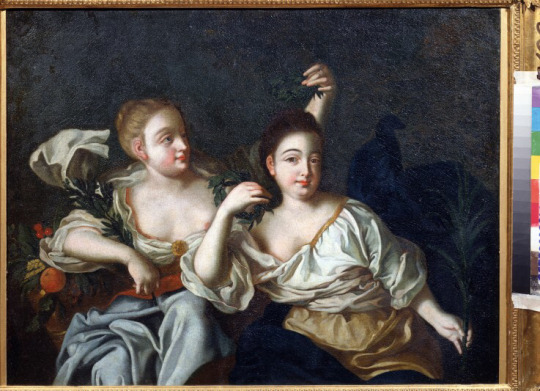
In 1721, serious marriage was on the table. Karl Friedrich of Schlewsig-Holstein-Gottorp was called to Russia, in order to meet Anna and her father. Karl had just entered his twenties, and his denouncers insisted that he was rude and arrogant. In comparison, Anna was barely thirteen years old, and incredibly shy.
This did not deter Peter, who was incredibly attracted by the idea of a Schleswig-Russian alliance. After a few years of shopping for other potential candidates, the marriage contract was signed. Ironically, the bride was not on the contract, and it was her father Peter and Karl Friedrich who signed. When the men signed the contract, Anna’s right to the Russian throne was instantly revoked.

In 1725, less than a year after the marriage between Anna and Karl Friedrich, Peter ‘the Great’ fell seriously ill. He called for Anna, whom he asked to write his will under his dictation. There has been great speculation over whether Peter planned to name Anna his heir; even though she had been forced to revoke her right to succession when her marriage was arranged, the Tsar of Russia still retained the power to elect his own heir regardless of the marriage contract terms. Peter was unable to speak, passing away shortly after, before declaring his heir. Whether or not Peter desired to make Anna heir remains one of history’s big ‘’what if’ questions.
In 1727, Anna and her husband Karl Freidrich moved to his native Kiel. Anna was deeply unhappy, missing her sister and nephew Peter Alexeievich; the Grand Duchess loved children. She wrote copious letters to her sister, Ekaterina, detailing her depression at being taken away from her home country. The rumours of Karl Freidrich’s arrogance appeared true; he preoccupied himself with affairs, leaving a pregnant Anna isolated.
In February, Anna gave birth to a baby boy, named Carl Peter Ulrich. Just days after, Anna contracted Puerperal fever, then known as ‘childbed fever’, a postpartum infection most likely caused by contaminated medical equipment and/or the medical staff not practicing proper hygiene. Anna became gravely ill, and requested to be buried back in her homeland, alongside her father in St. Petersburg. Her son Carl Peter survived the labour, and outlived his father, becoming the Duke of Holstein-Gottorp. When his aunt Elizaveta, Anna’s sister, died in 1762, Carl Peter became the Tsar of Russia, adopting the name Peter Feodorovich, Peter III.

Despite refusing to parent Anna himself, trying to marry her off when she was a child, and signing a marriage contract without Anna’s signature of consent, Peter claimed that Anna was his ‘favourite daughter.’ Only three of Peter’s fifteen legitimate children survived into adulthood. Anna died when she was only twenty years old. Her brother, Alexei Petrovich was imprisoned and tortured under the order of his father, dying from the torture. Only Anna’s beloved sister Elizaveta survived unscathed - the only out of fifteen siblings.

#the lost grand duchesses#anna petrovna#petrovichi#peter the great#he sounds like a tosser#alexei petrovich#old romanovs#russian history#romanov family#1700s#18th century#royal history#womens history#women in history#peter iii
30 notes
·
View notes